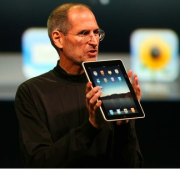Apple publicly names its overseas suppliers. A New York Times article blasts working conditions there. CEO Tim Cook angrily rebukes the charges in an internal memo. Consumers call for a boycott of Apple products.
Sound familiar?
Americans go through a series of hand wringing about overseas labor practices every few years. I remember covering this very topic in the late 1990s when apparel giant Nike was getting wrung over the coals for perceived child labor violations in its Indonesian factory.
At the time, global technology integrators operating in China told me they were getting nervous. Nike was quickly becoming the poster boy for corporate greed, thus putting crosshairs on any American company doing business internationally. The term "global economy" was yet to catch on.
But the issues run deeper than merely denouncing China's working conditions, which seem deplorable through the lens of American standards. And it's wrong to wag a disapproving finger at American companies taking advantage of cheap overseas labor.
For starters, we're to blame for most of it. American companies are also responsible but in a good way. Lastly, the New York Times article portrayed Apple's Chinese supplier, Foxconn, in a harsh light, but I'd argue the opposite is true: Foxconn is an example of how far China has come.
 Wanted: A Few Dollars More
Wanted: A Few Dollars MoreOscar Wilde once observed that people "know the price of everything and the value of nothing." The price of a product, it seems, is the only thing that truly matters to Americans. We expect an airline, for example, to offer stellar customer service even though we're quick to change airlines to save a few bucks.
When Apple delivered the iPad to the world two years ago, you might recall Apple fans cheering the low price. Apple had hit the $500 price point of the cheap netbook, even though most tech analysts thought the iPad would debut closer to $1,000.
Like the netbook, the iPad has lit the fuse of a pricing war. Hewlett-Packard's ill-fated TouchPad didn't start selling out until HP held a fire sale, slashing prices from $400 to $100. Amazon reportedly takes a loss on every $200 Kindle Fire it sells. The iPad 2 came out with the exact same pricing as the original iPad despite a boatload of new features: dual-core A5 chip, camera, thinner, lighter, etc.
We are a society fixated on price more than features, which is why American companies are forced to outsource manufacturing overseas to places like China were labor is cheap. And yet we cry foul over the horrible labor conditions there and hold American companies here accountable.
This sanctimonious stench wafts from time to time, allowing us to hold our noses in the air and feel good about ourselves. Then it evaporates just as quickly.
"Unfortunately, I don't think the China issue will make a huge impact" on Apple sales, says Andrew Eisner, director of community and content at Retrevo.com, a consumer electronics shopping site. "We've done surveys in the past about recycling and environmental friendliness, and the response wasn't too encouraging, either."
Shareholders of publicly traded companies like Apple also know this. Improvements cost money but don't lead to sales. That's why Apple likely won't make real changes to improve working conditions among its Chinese suppliers. Shareholders are the ultimate price watchers and lack a conscience. They are us.
Nike, Child Labor and Corporate Greed
Critics might argue that blaming the consumer detracts from the real tragedies taking place in overseas sweatshops. They will point to the public outrage of the late 1990s aimed at Nike. The apparel giant was employing 14-year-olds at its Indonesian factory, even though this was lawful under Indonesian labor laws. The bad publicity swayed CEO Phil Knight to raise the worker-age minimum to comply with U.S. laws.
The Nike case also had a lot to do with price point but in a different way. Nike could not use the tech industry's claims that cheap overseas labor is necessary to survive a pricing war. Nike shoes were being made overseas for a few dollars while retailing in the U.S. for over a hundred dollars. (Cue the aforementioned Wilde quote.)
Nike's margins were outrageous, making the company look greedy in the face of child labor.
At the time of the Nike debacle, global tech integrators told me that American companies operating in places like Indonesia and China should be celebrated, not vilified. It would be tragic for the people there if American companies pulled out their investments, they said. (These executives requested anonymity out of fear public backlash over Nike might turn toward them.)
The thinking goes that the only real way to improve labor conditions is the accumulation of capital. In other words, the reason 14-year-olds work in Indonesia lawfully is because they need to help put food on the table. That is, Indonesia's economic condition requires its people to work at a young age. As a country becomes more prosperous, working conditions and salaries will ultimately improve.
 Foxconn: Best Place to Work in China?
Foxconn: Best Place to Work in China?This is true even in communist China, albeit change happens more slowly because of the political climate. Think I'm crazy? Just compare working conditions at Chinese manufacturing plants a decade ago with Foxconn in the New York Times article this month.
In the article and accompanying photos, Foxconn looks much nicer than depictions of Chinese factories of yesteryear. I attribute a big part of this improvement not only to Apple's extensive supplier code of conduct but to years of investment by American tech companies.
While we shake our heads at Foxconn's brutal 60-hour work week, double shifts, low pay, suicides, and cramped housing, the article does little to put this into context with the rest of China. Foxconn employs some 1.2 million workers. Its suicide rate is below China's national average. Heck, it might be the dream job destination.
 Sure, the article leads with accounts of gruesome accidental deaths at Foxconn that most likely could have been prevented under better safety precautions. But aluminum dust explosions can and do happen everywhere. The article also points out similar deadly accidents that occurred recently at U.S. factories.
Sure, the article leads with accounts of gruesome accidental deaths at Foxconn that most likely could have been prevented under better safety precautions. But aluminum dust explosions can and do happen everywhere. The article also points out similar deadly accidents that occurred recently at U.S. factories.Bottom line: A case can be made that Apple and other tech companies have improved working conditions in China. Could Apple do more? Probably. But vilifying Apple for not doing more--even calling for a boycott of Apple products--is the height of hypocrisy.
If you really want to facilitate change, then make your donation to The Student Advocacy Committee, or SACOM, a non-profit organization whose mission is to improve labor conditions in China. Consider it a premium on your next consumer electronics purchase. Or else you can do what we always do and shelve your outrage for another year.
After all, the iPad 3 is coming out soon and I know what you're thinking: Come on, Apple, keep the price the same.

No comments:
Post a Comment